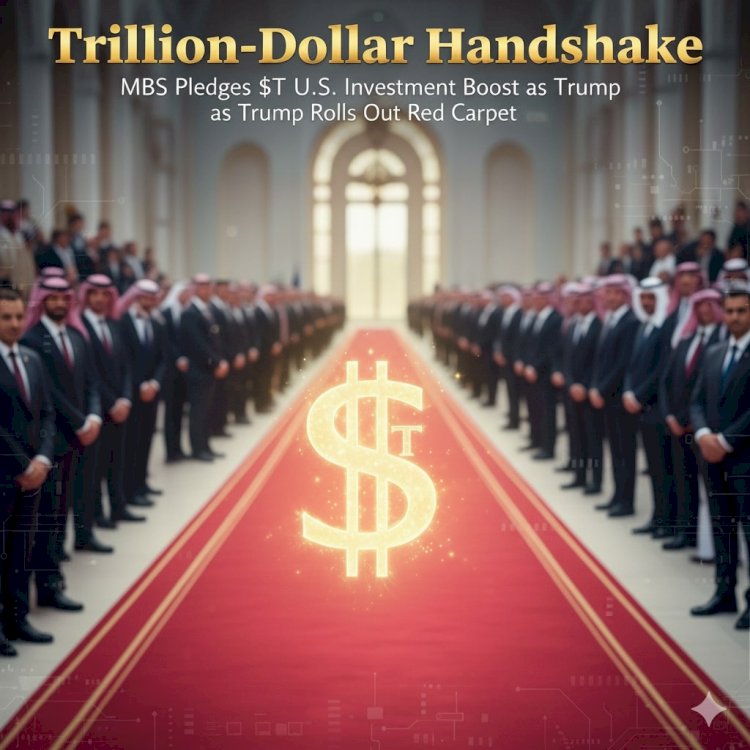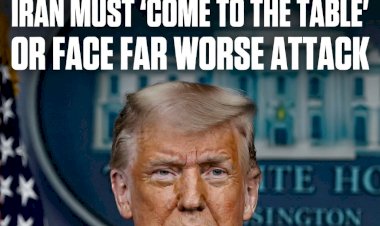Trillion-Dollar Handshake: MBS Pledges $1T U.S. Investment Boost as Trump Rolls Out Red Carpet

The White House echoed with the clink of champagne flutes and the buzz of deal-making on November 19, 2025, as Saudi Crown Prince Mohammed bin Salman—fresh from his Oval Office bromance with President Donald Trump—unveiled a jaw-dropping escalation in economic ties: a near-$1 trillion investment commitment to the United States. What began as a $600 billion pledge during yesterday's summit has ballooned into the largest foreign investment vow in modern history, spanning AI data centers, nuclear reactors, and fighter jets—promising a flood of jobs while reigniting debates over human rights and fiscal realism.
From $600B to $1T: The Pledge That Redefines U.S.-Saudi Synergy
It was Trump who first dangled the trillion-dollar carrot in the Oval Office on Tuesday, quipping to reporters, "You've agreed to invest $600 billion into the United States, and because he's my friend, he might make it a trillion—but I'm going to have to work on him." MBS, ever the quick study, seized the moment. "Today and tomorrow, we are going to announce that we are going to increase that $600 billion to almost $1 trillion of investment—real investment and real opportunity in many areas," the crown prince declared, his words broadcast live to a rapt audience.
The announcement capped a whirlwind 24 hours at the U.S.-Saudi Investment Forum at the Kennedy Center, where executives from Nvidia, Elon Musk's xAI, and Saudi Aramco inked $270 billion in preliminary deals. Highlights include HUMAIN—a Saudi government-backed AI firm—snapping up 600,000 Nvidia chips for massive data centers, and a joint xAI-HUMAIN venture to build a 500-megawatt facility in the desert kingdom. Oil behemoth Aramco alone signed 17 memoranda worth over $30 billion with U.S. firms, from rare earth refineries with MP Materials to energy tech partnerships.
Trump, beaming beside MBS, framed it as a win for American workers: "This means investments in plants, in companies, money on Wall Street. And what it really counts is jobs—a lot of jobs." The White House fact sheet touted the surge as a "deepening trust" under Trump's leadership, positioning the U.S. as the unrivaled hub for Saudi's Vision 2030 diversification away from oil.
Tech, Defense, and Energy: The Pillars of the Petro-Dollar Pivot
The trillion-dollar pie breaks down into ambitious slices. Defense leads with Trump's green light on F-35 sales—up to 100 stealth fighters for Riyadh, a multibillion-dollar boon to Lockheed Martin despite Israel's grumbles over eroded air superiority. Nuclear ambitions follow: a framework for 16 U.S.-built reactors with Westinghouse and Bechtel, ensuring Saudi's atomic dreams stay under American oversight.
Tech gets the lion's share, with loosened export controls on GPUs from Nvidia, AMD, and Intel to fuel Saudi AI hubs. Critical minerals round it out—MP Materials and Saudi mining giant Maaden partnering on a DoD-backed rare earth refinery to counter China's dominance. "We're not creating fake opportunities to please America or please Trump," MBS insisted when pressed on feasibility amid slumping oil prices. "Saudi Arabia has huge demand for computing power and desires U.S. partnerships."
Yet skeptics whisper caution. Analysts note Saudi's domestic cash crunch—billions already sunk into over-budget megacities like NEOM and 2034 World Cup stadiums—makes a full trillion a stretch. Past Trump-era boasts, like a $450 billion investment that materialized as just $92 billion in exports, fuel doubts. Still, the kingdom's sovereign wealth fund, the Public Investment Fund (PIF), holds $925 billion in assets, giving the pledge plausible heft if spread over a decade.
Khashoggi's Shadow and Critics' Chorus: A Deal with Strings?
No Saudi windfall comes without baggage. As MBS schmoozed with Corporate America—rubbing elbows with Jamie Dimon and Musk—the specter of Jamal Khashoggi's 2018 murder haunted the halls. Trump dismissed a reporter's pointed question with a curt, "Things happen," praising MBS's "phenomenal job" on human rights despite State Department red flags. Amnesty International decried the "red-carpet treatment" as a "betrayal of justice," while 9/11 families protested outside, slamming it as "blood money diplomacy."
Israel, too, balked at the F-35s, with IDF officials warning of damaged "qualitative military edge." And on normalization? MBS hedged, expressing positivity toward Abraham Accords expansion but tying it to ironclad U.S. guarantees against "aggression." Trump's pitch: Saudi-Israel peace as the "north star," sweetened by these mega-deals.
Jobs Jubilee or Mirage? The Ripple Effects Unfold
Wall Street cheered: Lockheed surged 6.8% pre-market, Nvidia climbed 4.1%. Labor unions eyed the promise of "high-paying American jobs" in supply chains from Texas refineries to California chip fabs. For Trump, it's red meat for his base—a trillion-dollar testament to "America First" diplomacy, offsetting deficits and burnishing his dealmaker cred ahead of midterms.
For MBS, it's rehabilitation gold: from Khashoggi pariah to indispensable ally, burnishing Vision 2030 with U.S. tech muscle. As the prince departs Thursday after signing ceremonies, the trillion-dollar question lingers: Will this be the deal that reshapes the Middle East economy, or another headline outpacing reality?
In Washington, where handshakes seal fortunes, one truth endures—the petrodollars flow, but the strings attached? They're longer than ever.

 content-team
content-team 


















